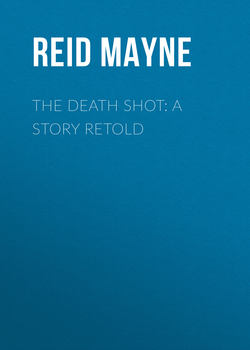Читать книгу The Death Shot: A Story Retold - Reid Mayne - Страница 8
Chapter Six.
A coon-chase interrupted
ОглавлениеNotwithstanding the solitude of the place where the strife, apparently fatal, has occurred, and the slight chances of its being seen, its sounds have been heard. The shots, the excited speeches, and angry exclamations, have reached the ears of one who can well interpret them. This is a coon-hunter.
There is no district in the Southern States without its coon-hunter. In most, many of them; but in each, one who is noted. And, notedly, he is a negro. The pastime is too tame, or too humble, to tempt the white man. Sometimes the sons of “poor white trash” take part in it; but it is usually delivered over to the “darkey.”
In the old times of slavery every plantation could boast of one, or more, of these sable Nimrods; and they are not yet extinct. To them coon-catching is a profit, as well as sport; the skins keeping them in tobacco – and whisky, when addicted to drinking it. The flesh, too, though little esteemed by white palates, is a bonne-bouche to the negro, with whom animal food is a scarce commodity. It often furnishes him with the substance for a savoury roast.
The plantation of Ephraim Darke is no exception to the general rule. It, too, has its coon-hunter – a negro named, or nicknamed, “Blue Bill;” the qualifying term bestowed, from a cerulean tinge, that in certain lights appears upon the surface of his sable epidermis. Otherwise he is black as ebony.
Blue Bill is a mighty hunter of his kind, passionately fond of the coon-chase – too much, indeed, for his own personal safety. It carries him abroad, when the discipline of the plantation requires him to be at home; and more than once, for so absenting himself, have his shoulders been scored by the “cowskin.”
Still the punishment has not cured him of his proclivity. Unluckily for Richard Darke, it has not. For on the evening of Clancy’s being shot down, as described, Blue Bill chances to be abroad; and, with a small cur, which he has trained to his favourite chase, is scouring the timber near the edge of the cypress swamp.
He has “treed” an old he-coon, and is just preparing to ascend to the creature’s nest – a cavity in a sycamore high up – when a deer comes dashing by. Soon after a shot startles him. He is more disturbed at the peculiar crack, than by the mere fact of its being the report of a gun. His ear, accustomed to such sounds, tells him the report has proceeded from a fowling-piece, belonging to his young master – just then the last man he would wish to meet. He is away from the “quarter” without “pass,” or permission of any kind.
His first impulse is, to continue the ascent of the sycamore, and conceal himself among its branches.
But his dog, remaining below – that will betray him?
While hurriedly reflecting on what he had best do, he hears a second shot. Then a third, coming quickly after; while preceding, and mingling with the reports are men’s voices, apparently in mad expostulation. He hears, too, the angry growling of a hound, at intervals barking and baying.
“Gorramity!” mutters Blue Bill; “dar’s a skrimmage goin’ on dar – a fight, I reck’n, an’ seemin’ to be def! Clar enuf who dat fight’s between. De fuss shot wa’ Mass’ Dick’s double-barrel; de oder am Charl Clancy rifle. By golly! ’taint safe dis child be seen hya, no how. Whar kin a hide maseff?”
Again he glances upward, scanning the sycamore: then down at his dog; and once more to the trunk of the tree. This is embraced by a creeper – a gigantic grape-vine – up which an ascent may easily be made; so easily, there need be no difficulty in carrying the cur along. It was the ladder he intended using to get at the treed coon.
With the fear of his young master coming past – and if so, surely “cow-hiding” him – he feels there is no time to be wasted in vacillation.
Nor does he waste any. Without further stay, he flings his arm around the coon-dog: raises the unresisting animal from the earth; and “swarms” up the creeper, like a she-bear carrying her cub.
In ten seconds after, he is snugly ensconced in a crotch of the sycamore; screened from observation of any one who may pass underneath, by the profuse foliage of the parasite.
Feeling fairly secure, he once more sets himself to listen. And, listening attentively, he hears the same voices as before. But not any longer in angry ejaculation. The tones are tranquil, as though the two men were now quietly conversing. One says but a word or two; the other all. Then the last alone appears to speak, as if in soliloquy, or from the first failing to make response.
The sudden transition of tone has in it something strange – a contrast inexplicable.
The coon-hunter can tell, that he continuing to talk is his young master, Richard Darke; though he cannot catch, the words, much less make out their meaning. The distance is too great, and the current of sound interrupted by the thick standing trunks of the cypresses.
At length, also, the monologue ends; soon after, succeeded by a short exclamatory phrase, in voice louder and more earnest.
Then there is silence; so profound, that Blue Bill hears but his own heart, beating in loud sonorous thumps – louder from his ribs being contiguous to the hollow trunk of the tree.
